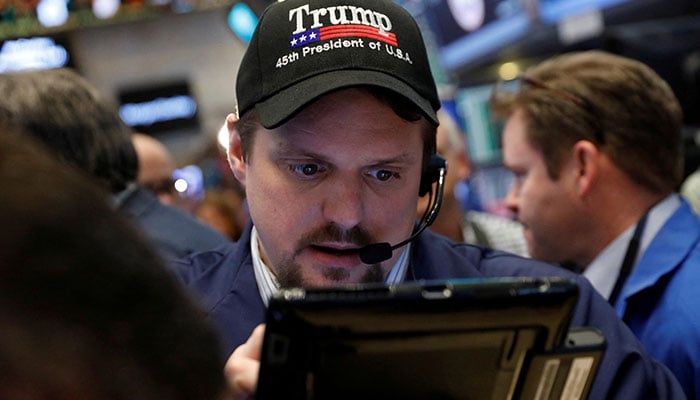Trump reciprocal tariffs spark global sell-off, send markets in turmoil
Euro rallied 1.53% against dollar as greenback weakened 2.07% to 146.15 against Japanese yen
NEW YORK/LONDON: Global markets plunged, the US dollar fell, and oil prices tumbled as President Donald Trump’s new reciprocal tariffs rattled investors, fuelling fears of a trade war and a deeper economic slowdown.
A new baseline 10% tariff on imported goods, plus some eye-watering reciprocal tariffs on dozens of countries that Trump said had unfair trade barriers, left traders rattled by their severity.
Investors fear a full-blown trade dispute could trigger a sharp global economic slowdown and drive up inflation, with the latest round of US trade tariffs hitting a world economy barely recovered from the post-pandemic inflation surge and dealing with geopolitical strife.
The euro rallied 1.53% against the dollar. Against the Japanese yen, the dollar weakened 2.07% to 146.15.
The Nasdaq was down more than 5%, with technology-related shares among the day's biggest drags. Apple fell 9.2%, hit by the tariffs on China – the base for much of its manufacturing. Amazon.com was down 7.9%, Microsoft was off 1.5%, and Nvidia was down 6.9%.
The losses come after trillions of dollars were already wiped off the "Magnificent Seven" tech giants this year as worries have mounted.
The CBOE Volatility Index, known as Wall Street's fear gauge, touched a three-week high at 26.91 points. The S&P 500 energy sector was down more than 6% as oil prices sank.
"This is just another chapter of the market in a bottoming process," said Bruce Zaro, managing director at Granite Wealth Management in Plymouth, Massachusetts.
Investors are adjusting their outlook partly based on the potential impact of tariffs on corporate earnings, he said, adding, "What we have already seen and are going to continue to see are drastic reductions in earnings estimates. That's going to play out and drag on for some time."
The Dow Jones Industrial Average fell 1,317.59 points, or 3.12%, to 40,909.33, the S&P 500 fell 227.17 points, or 4.01%, to 5,443.80, and the Nasdaq Composite fell 912.44 points, or 5.18%, to 16,688.61.
MSCI's gauge of stocks across the globe fell 23.64 points, or 2.83%, to 812.47.
Reciprocal Levy
In Europe, the 27-country EU bloc now faces a 20% reciprocal levy. The pan-European STOXX 600 index fell 2.57%.
Trump's levies impacted Asia particularly hard. China was hit with a 34% reciprocal tariff, Japan 24%, South Korea 25%, and Vietnam 46%.
Vietnamese stocks slumped 6.7% in response. The Nikkei 225 index fell 2.8%.
"This is how you sabotage the world’s economic engine while claiming to supercharge it," said Nigel Green, CEO of global financial advisory deVere Group.
Vietnam's Prime Minister Pham Minh Chinh pledged to maintain the country's economic growth target of at least 8% for this year, despite the US imposing its hefty tariff on the Southeast Asian nation's exports.
The scramble for ultra-safe government bonds that provide a guaranteed income drove down US Treasury yields. The yield on the benchmark US 10-year Treasury note fell 15.3 basis points to 4.042% after falling to 4.004%, its lowest since 16 October. The yield on the note was on track for its biggest daily drop since 2 August.
Euro area government bond yields dropped, with Germany's 10-year yield DE10YT=RR, the euro area's benchmark, down 7.5 basis points at 2.65%, after hitting 2.625%, its lowest since 4 March.
If the tariffs trigger recessions, central banks around the world are likely to slash interest rates, which benefit bonds.
Credit rating agency Fitch warned they were a "game-changer" for the US and global economy, while Deutsche Bank called them a "once in a lifetime" moment that could knock between 1%-1.5% off US growth this year.
"Many countries will likely end up in a recession," said Fitch's head of US economic research, Olu Sonola. "You can throw most forecasts out the door if this tariff rate stays on for an extended period of time."
Shortly afterwards, Fitch downgraded China's credit rating, citing the steep US tariffs as a reason.
Oil prices dropped, with US crude CLc1 down 6.5% at $67.05 a barrel and Brent LCOc1 at $70.27 per barrel, down 6.24% on the day.
-
Global memory chip crunch puts spotlight on Apple; Will iPhone become more pricey?
-
Bitcoin plummets toward $60,000 as investors dump risky bets
-
Bitcoin crashes below $63K as regulatory pressure and market fears grow
-
Bitwise Crypto Industry innovators ETF: What investors should do in 2026?
-
Nintendo shares slide again as momentum fears grow
-
Gold, silver prices fallen sharply; What’s driving the drop?
-
Gold’s record climb: Experts question if its safety is ‘overstated’
-
Dubai unveils plans to construct street built with real gold












